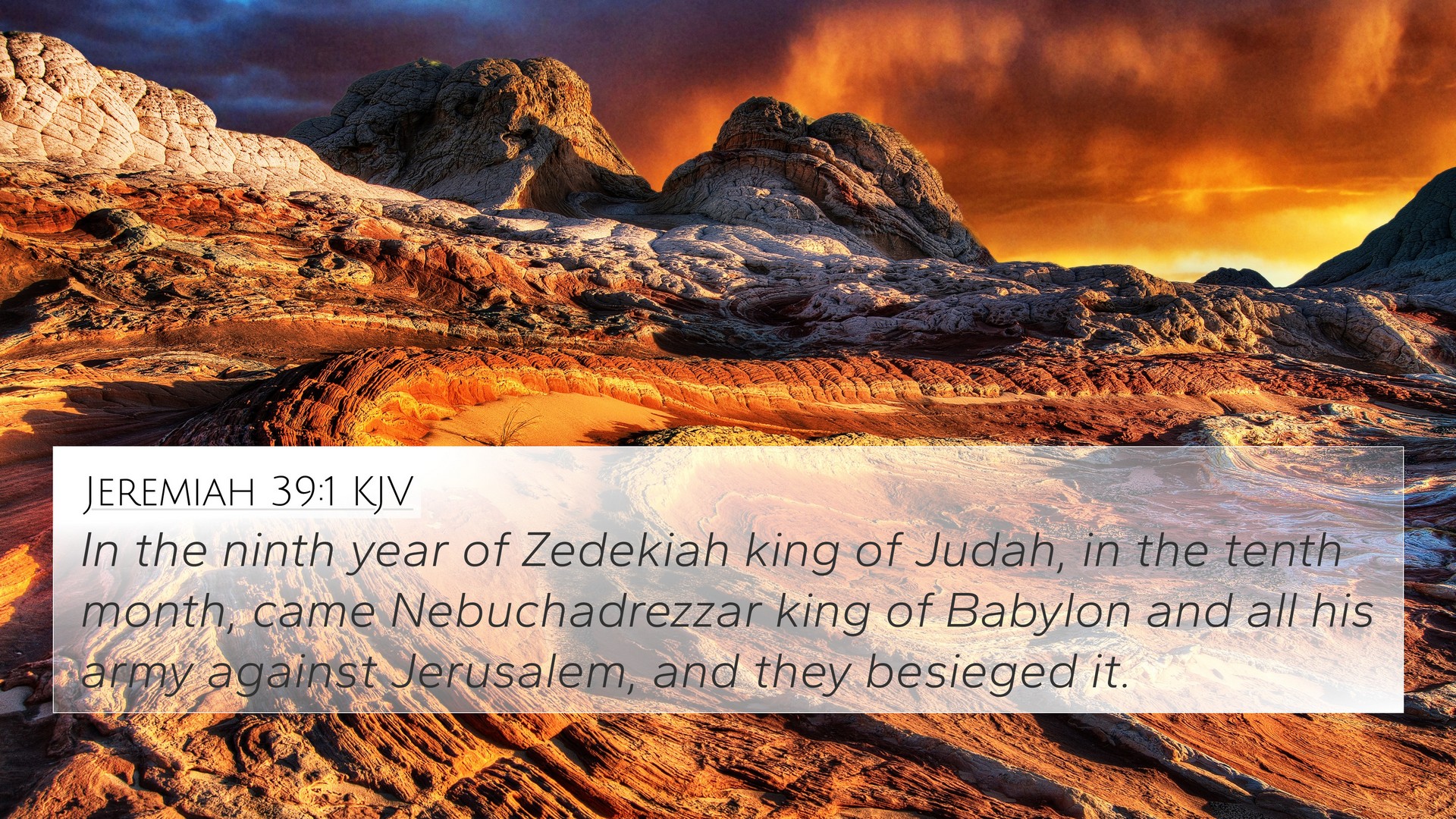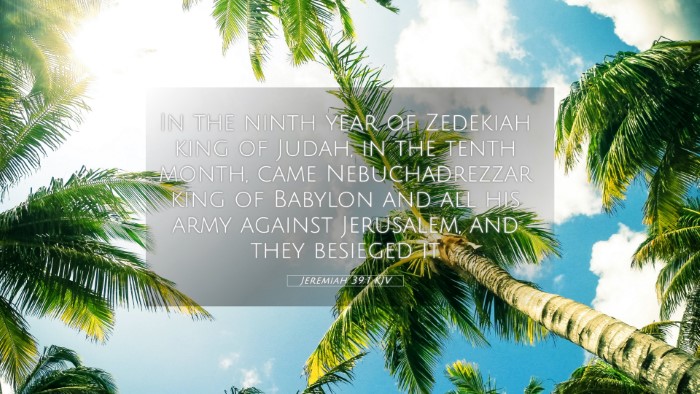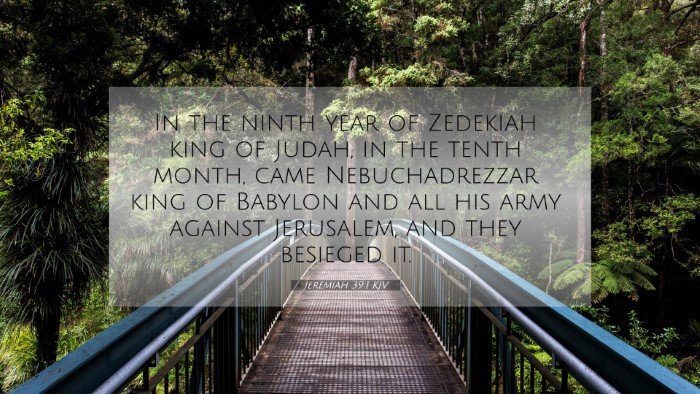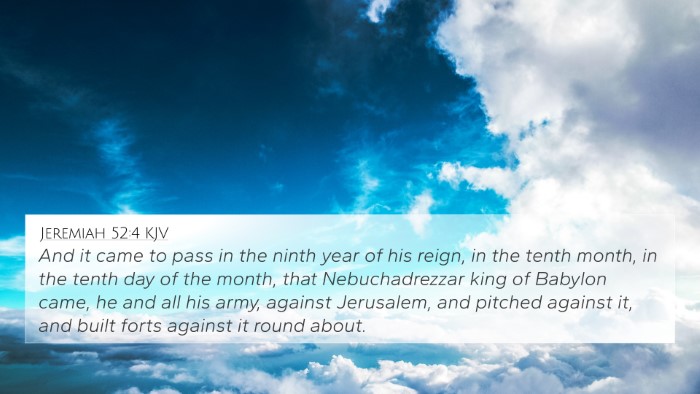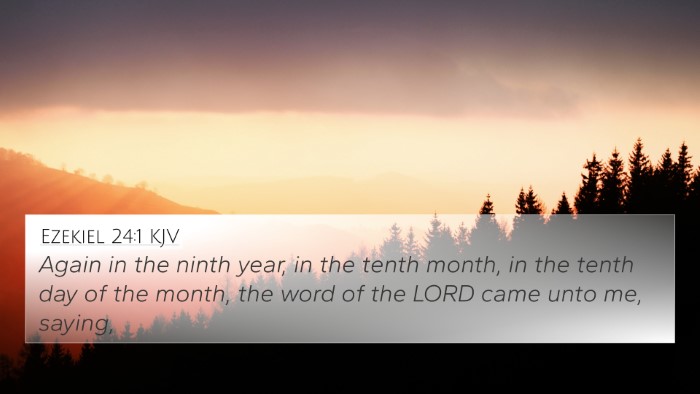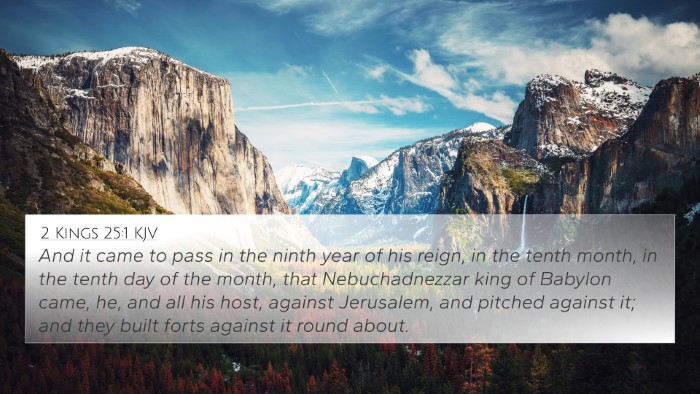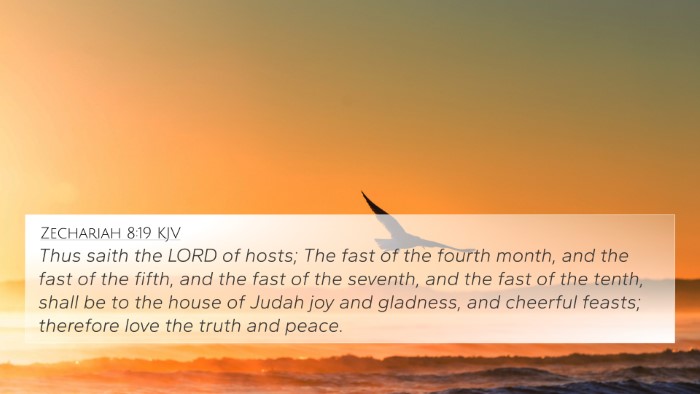Understanding Jeremiah 39:1
Jeremiah 39:1 states: "In the ninth year of Zedekiah king of Judah, in the tenth month, Nebuchadnezzar king of Babylon and all his army came against Jerusalem and besieged it."
This verse marks a significant moment in the history of Israel and highlights the fulfillment of God's warnings through the prophet Jeremiah about the impending destruction of Jerusalem.
Summary of Context and Meaning
The prophet Jeremiah, known as the Weeping Prophet, has spent considerable time warning the people of Judah about the consequences of their sin and disobedience to God. This verse situates the events in a historical timeline, establishing the seriousness of the situation as the Babylonian army approaches Jerusalem.
- Historical Significance: The mention of Zedekiah, the last king of Judah, signifies the dire state of Judah as a nation. Jeremiah's prophecies warned that rebellion against Babylon would lead to ruin, which was now coming to pass.
- Divine Judgment: Jeremiah’s message culminates in this moment, showing that God's judgment against Jerusalem was inevitable due to their persistent idolatry and rejection of God's law.
- Fulfillment of Prophecy: This siege aligns with previous prophecies that Jeremiah delivered (e.g., Jeremiah 25:8-11), making it a fulfillment of God’s Word.
Insights from Commentaries
Various theologians have provided insights about this verse:
- Matthew Henry: He emphasizes the importance of recognizing the sovereignty of God over nations. Henry explains that the siege illustrates the active role God plays in the rise and fall of powers, serving as a lesson in humility and submission to God’s will.
- Albert Barnes: Barnes discusses the timeline presented in the verse, linking it to the broader narrative of the Babylonian exile. He points out that this moment is both a historical and prophetic turning point, showcasing God's judgment as well as his ultimate plan for restoration.
- Adam Clarke: Clarke explains that the siege reflects the rebellion of Jerusalem against God, portraying the city’s spiritual state. He emphasizes this moment as a culmination of repeated calls to repentance that fell on deaf ears.
Bible Verse Cross-References
To understand Jeremiah 39:1 more deeply, we can draw connections with various other scriptures:
- Jeremiah 25:8-11: This passage foretells of Babylon’s role as the instrument of God’s judgment against Jerusalem.
- 2 Kings 25:1-7: This recounts the actual fall of Jerusalem, confirming the events prophesied by Jeremiah.
- Ezekiel 33:21-22: This features Ezekiel confirming the news of the fall of Jerusalem and shows the repercussions of the people's disobedience.
- Zechariah 14:1-2: This speaks to the future invasions of Jerusalem, linking past events to prophetic warnings.
- Lamentations 1:1-3: This highlights the sorrow and devastation of Jerusalem after the siege, offering a poignant reflection on the aftermath of the prophecies.
- Daniel 1:1-3: This reveals the broader context of the Babylonian captivity, illustrating how Nebuchadnezzar took captives from Judah.
- Isaiah 39:5-7: Reflects the prophetic warning of the future destruction and captivity of Judah.
- Amos 3:2: This emphasizes the accountability of God’s chosen people, which correlates with the theme of judgment seen in Jeremiah.
Applications and Reflections
From Jeremiah 39:1, several applications can be drawn for contemporary readers:
- Recognition of God's Sovereignty: Understanding that God's plans will ultimately come to fruition encourages believers to trust in His purposes, even amid adversity.
- The Consequences of Disobedience: This verse serves as a stark reminder of the unyielding nature of sin and the resulting consequences.
- The Importance of Repentance: Reflecting on the reasons for Judah’s fall encourages believers today to seek God earnestly and turn away from sin.
Thematic Bible Verse Connections
Exploring thematic connections between this verse and others enriches our understanding of its message:
- Hope in Restoration: While Jeremiah 39:1 depicts judgment, other verses like Jeremiah 29:11 bring a message of hope, illustrating God’s plans for restoration.
- Endurance in Trials: Hebrews 12:1-2 encourages believers to run the race with endurance, paralleling the struggle and ultimate hope expressed in the book of Jeremiah.
- Grace in Judgment: The New Testament’s message of grace (e.g., Romans 5:20) illustrates that while there may be judgment, God’s grace abounds to restore those who repent.
Conclusion
Jeremiah 39:1 serves as a powerful reminder of the consequences of straying from God and the importance of heeding His warnings. By studying cross-references and themes, we engage in a deeper understanding of God’s character and the narrative of redemption present throughout Scripture.
